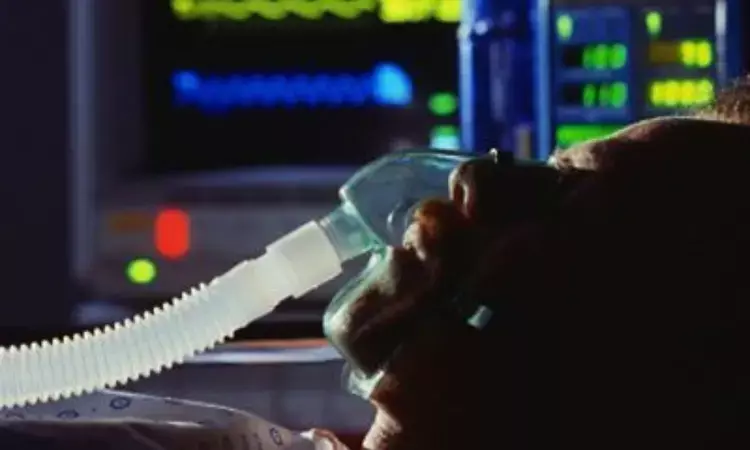- Home
- Medical news & Guidelines
- Anesthesiology
- Cardiology and CTVS
- Critical Care
- Dentistry
- Dermatology
- Diabetes and Endocrinology
- ENT
- Gastroenterology
- Medicine
- Nephrology
- Neurology
- Obstretics-Gynaecology
- Oncology
- Ophthalmology
- Orthopaedics
- Pediatrics-Neonatology
- Psychiatry
- Pulmonology
- Radiology
- Surgery
- Urology
- Laboratory Medicine
- Diet
- Nursing
- Paramedical
- Physiotherapy
- Health news
- Fact Check
- Bone Health Fact Check
- Brain Health Fact Check
- Cancer Related Fact Check
- Child Care Fact Check
- Dental and oral health fact check
- Diabetes and metabolic health fact check
- Diet and Nutrition Fact Check
- Eye and ENT Care Fact Check
- Fitness fact check
- Gut health fact check
- Heart health fact check
- Kidney health fact check
- Medical education fact check
- Men's health fact check
- Respiratory fact check
- Skin and hair care fact check
- Vaccine and Immunization fact check
- Women's health fact check
- AYUSH
- State News
- Andaman and Nicobar Islands
- Andhra Pradesh
- Arunachal Pradesh
- Assam
- Bihar
- Chandigarh
- Chattisgarh
- Dadra and Nagar Haveli
- Daman and Diu
- Delhi
- Goa
- Gujarat
- Haryana
- Himachal Pradesh
- Jammu & Kashmir
- Jharkhand
- Karnataka
- Kerala
- Ladakh
- Lakshadweep
- Madhya Pradesh
- Maharashtra
- Manipur
- Meghalaya
- Mizoram
- Nagaland
- Odisha
- Puducherry
- Punjab
- Rajasthan
- Sikkim
- Tamil Nadu
- Telangana
- Tripura
- Uttar Pradesh
- Uttrakhand
- West Bengal
- Medical Education
- Industry
Induced hypothermia fails to improve functional outcomes or survival after cardiac arrest in hospital

Germany: Hypothermic temperature control after in-hospital cardiac arrest (IHCA) did not seem to improve survival or functional outcome at day 180 compared with normothermia, according to results from The HACA-IHCA (Hypothermia After In-Hospital Cardiac Arrest) trial published in Circulation.
"The HACA-IHCA trial was underpowered and may have been unable to detect clinically important differences between hypothermic temperature control and normothermia," Kevin Roedl, University Medical Center Hamburg-Eppendorf, Hamburg, Germany, and colleagues wrote in their study.
The study was undertaken to determine the effect of hypothermic temperature control following an in-hospital cardiac arrest on functional outcome and death versus normothermia. The HACA-IHCA was an open-label, investigator-initiated, multicenter, blinded-outcome-assessor, and randomized controlled trial that compared hypothermic temperature control (32-34°C) for 24 h versus normothermia following cardiac arrest in 11 hospitals in Germany.
All-cause mortality after 180 days was the stud's primary endpoint. Secondary endpoints were favorable functional outcomes and in-hospital mortality using the Cerebral Performance Category scale after 180 days; a score of 1 or 2 was defined as a favorable functional outcome.
Screening of 1055 patients was done for eligibility and randomization of 249 patients: 126 were given hypothermic temperature control and 123 to hypothermia. The mean age was 72.6 years, 64% were males, 73% of cardiac arrests were seen, 25% had an initial shockable rhythm, and the time to return spontaneous Circulation was 16.4±10.5 minutes.
The study led to the following findings:
- In the hypothermic group, the target temperature was reached within 4.1 hours after IHCA, and in the normothermic group, the temperature was controlled for 48 hours at 37.0°±0.9°C.
- Mortality by day 180 was 72.5% in the hypothermic temperature control arm, compared with 71.2% in the normothermia group (relative risk, 1.03).
- In-hospital mortality was 62.5% in the hypothermic temperature control compared to 57.6% in the normothermia group (relative risk, 1.11).
- In the hypothermic temperature control, the favorable functional outcome (Cerebral Performance Category 1 or 2) by day 180 was 22.5% compared with 23.7% in the normothermia group (relative risk, 1.04).
- The study was terminated prematurely because of futility.
"Neither survival nor functional outcome improved at day 180 in patients presenting with coma after IHCA with hypothermic temperature control versus normothermia," the researchers wrote in their study.
The HACA-IHCA (Hypothermia After In-Hospital Cardiac Arrest) trial was underpowered and may not have been able to detect clinically meaningful differences between hypothermic temperature control and normothermia.
Reference:
Wolfrum S, Roedl K, Hanebutte A, Pfeifer R, Kurowski V, Riessen R, Daubmann A, Braune S, Söffker G, Bibiza-Freiwald E, Wegscheider K, Schunkert H, Thiele H, Kluge S. Temperature Control After In-Hospital Cardiac Arrest: A Randomized Clinical Trial. Circulation. 2022 Sep 28:101161CIRCULATIONAHA122060106. doi: 10.1161/CIRCULATIONAHA.122.060106. Epub ahead of print. PMID: 36168956.
Dr Kamal Kant Kohli-MBBS, DTCD- a chest specialist with more than 30 years of practice and a flair for writing clinical articles, Dr Kamal Kant Kohli joined Medical Dialogues as a Chief Editor of Medical News. Besides writing articles, as an editor, he proofreads and verifies all the medical content published on Medical Dialogues including those coming from journals, studies,medical conferences,guidelines etc. Email: drkohli@medicaldialogues.in. Contact no. 011-43720751


